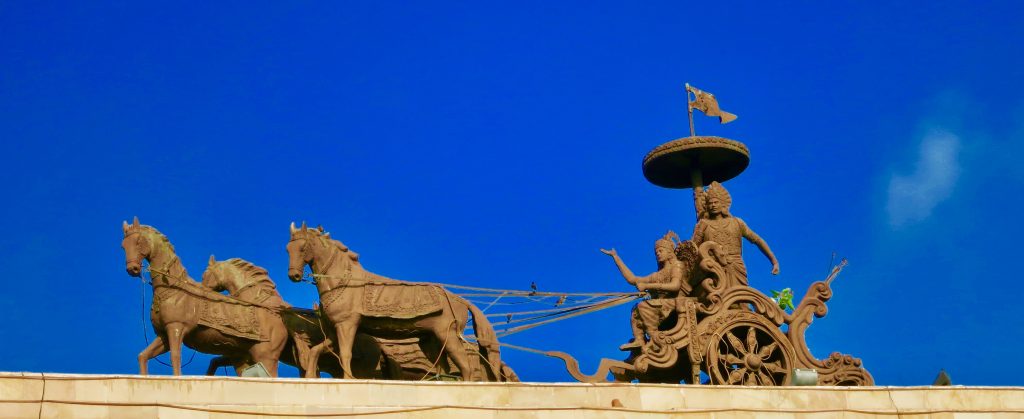The Parable of the Chariot – Kathopanishad

In the ancient Indian text of the Kathopanishad, the central theme revolves around the story of a young boy, Nachiketa– the son of Sage Vajasravasa, who meets Yama, the god of death (in the hindu religion) and asks to receive the secret knowledge of the nature of man, of the Soul and of liberation.
Yama, on Nachiketa’s insistence, eventually imparts this secret knowledge to him.
The following verses, from the Kathopanishad (translated from sanskrit), reveals a part of this knowledge through the Parable of the Chariot –
verse:
3. Know the Self as the lord of the chariot and the body as, verily, the chariot,
know the intellect as the charioteer
and the mind as the reins.
explanation:
The soul is the lord of the chariot.
The physical body is the chariot.
The intellect is the driver of the chariot.
The mind is the reins of the chariot.
verse:
4. The senses, they say, are the horses; the objects of enjoyment the paths [they range over];
[the Self] associated with the body; [comprised of] the senses and the mind – the enlightened ones declare – is the enjoyer.
explanation:
The senses, (eyes to see, ears to hear, skin to touch, nose to smell, tongue to taste), are the horses.
The sense objects, (sound, form, touch, taste, scent) are the roads or paths that the horses travel on.
The enlightened ones call the soul combined with the body (senses & mind) – the enjoyer (not the pure atman/soul but the one immersed in samsara).
verse:
5. The senses of one who has no insight, whose mind is always unrestrained,
are out of control,
as unruly horses are for a charioteer.
explanation:
When there is no restraint and insight of the mind and the senses, they become out of control. Just like unrestrained horses who become unruly and cannot be controlled by the charioteer.
verse:
6. However, one who has insight, whose mind is always restrained; his senses are under control, as good horses are for a charioteer.
explanation:
With insight and restraint, the senses (in the form of the horses), are in control and the intellect (charioteer) is able to hold the reins (mind) steady and guide the chariot (body) on the right path.
verse:
7. One, however, who has no insight, who has no control over the mind (and is) ever impure, reaches not that goal but returns to saṁsāra. (the cycle of death and rebirth)
verse:
8. One, however, who has insight, who has controlled the mind and is ever pure, reaches that goal from which one is not born again.
verse:
9. One who has insight for the driver of the chariot and controls the rein of the mind, reaches the end of the journey, that supreme abode of the all-pervading Vishnu. (Self-luminous)
explanation:
He whose charioteer in the form of the intellect is wise and discerning, whose reins in the form of the mind is properly controlled and whose horses in the form of the senses are well-disciplined – such a soul possessed of a pure heart, reaches the supreme state wherefrom he does not return.
Events happen, based on one’s karma. Perhaps the only answer to the question of free will is the Parable of the Chariot.
Share This Story, Choose Your Platform!


Leave A Comment